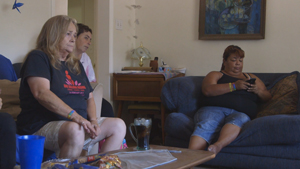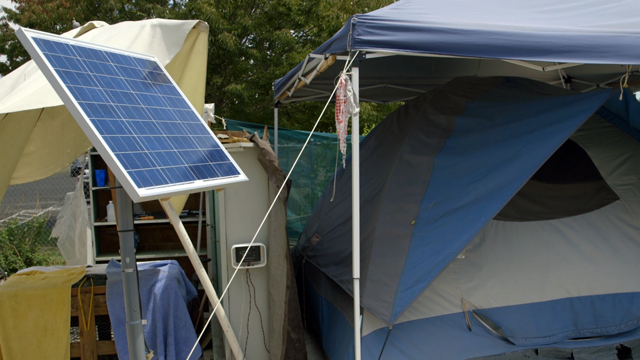Communal Project in Fresno Has Found a Different Way to Treat the Homeless [Video]
Nancy Holmes grabs an olive from a bowl on the kitchen counter. “I think these oughta be test-driven before they go in the pasta,” she says with a laugh.
It’s dinnertime at Dakota EcoGarden in Fresno. The folks gathered here to cook and share a meal aren’t related — but they’re all connected by homelessness. Some are advocates like Dixie Salazar, a local poet and painter. Others, like Brittani Fanciullo and Holmes, are survivors of life on the streets.
"All right, pass me everything!” Fanciullo says enthusiastically, looking at a table full of summery dishes.
“Everything all at once?” someone asks.
These days, Fanciullo, 30, spends plenty of time in this kitchen. She does a lot of cooking.
“They [my housemates] always drag me into cooking, and tons of cleaning, and I always do what I can out in the yard,” she says.
Fanciullo says she does her part because she gets to live at Dakota EcoGarden for free. She moved in nine months ago, sober after years of drug use.
Dakota EcoGarden is a communal project for the homeless spearheaded by retired schoolteacher Nancy Waidtlow. She wanted to create a safe space for people to live.
“And I’m sure being over 70 years old and not having that much to lose is part of it,” says Waidtlow with her characteristic dry humor.
So, she took her savings and some inheritance money and bought and refurbished a $64,000 house with a yard roomy enough for nine tents on pallets and an organic garden.

Plenty of people questioned Nancy Waidtlow’s sanity, some of them asking her, “What the hell was I thinking?” Her response? “I mean fools rush in where angels fear to tread!”
But Waidtlow says she believes in the golden rule and couldn’t stand watching the homeless encampments in downtown Fresno get bulldozed. She also likes to get things done, so she corralled a few fellow activists and they emboldened themselves with little outside guidance but plenty of chutzpah.
Fresno has been in the national spotlight for its controversial policies regarding the homeless. In 2008, the city lost a $2.35 million class-action lawsuit for destroying personal property when it bulldozed several encampments.
Last year, 62-year-old Nancy Holmes lived in an encampment for eight months after losing her job as a security guard. A nearby canal provided a decent bathing spot. “I’d take a jug of water and set it in the sun and wash my hair,’ she says.
But then the city bulldozed the camp , along with other encampments downtown.
“It was the worst thing I think I’d ever experienced out there,” she says. “Because that was my home.”

Holmes moved to Dakota EcoGarden nine months ago and is the official go-to person. “It’s given me a new life, coming here,” she says.
Waidtlow says some lessons were learned the hard way — like the time a homeless woman wrecked the car she was living in and desperately needed a place to stay.
“It was a real emergency,” says Waidtlow, who allowed the person to stay. “But, you know, she did abandon us and her cat and all her drug paraphernalia."
Waidtlow learned her lesson. “So we have an intake procedure now, and that includes drug testing,” she says.
Applicants have to test clean for 90 days. And there are other criteria: no severe mental illness and no violence. There’s no limit to how long residents can stay, but they’re expected to do their share of household chores. Although there is the occasional conflict, so far things seem to be running pretty smoothly, with everyone lending some expertise.
One resident installed solar panels so the tents could have electricity. Others tend the garden, like 58-year-old Frank, who asked not to use his real name. Frank ran his own business until he had some debilitating health problems. While he looks for a new job, he’s also putting his agriculture degree to work.
“I mean, I’ve seen some little infestation here and there, of course. Aphids got to the squash, too,” he says pointing to a row of vegetables in the organic garden. “So that’s what’s going on, but see, you can see the tomatoes are really doing well.”
He says he’s thankful for the opportunity to live here. “I was gonna be basically living out of my truck and you know, fortunately, this situation came up and it’s worked out great. I mean you could say it’s a symbiotic relationship -- no pun intended!”
Not far from the garden is another green project, the EcoShelter. It’s essentially an off-the-grid tiny house designed by renowned local architect Art Dyson and built by retired professor Jerry Bill.

“It’s solar-heated, solar-cooled and a small place made to feel big,” says Bill, who has assisted in many projects around the house. “And Art’s whole idea is that it’s got to be a dignified dwelling — makes a person feel proud to live in it.”
Like 46-year-old Gerardo Castillo, who gets to live in it because he’s been here the longest, one year.
“I get my own little backyard,” Castillo says, pointing to an area between the fence and the shelter. “I wouldn’t mind having a dog, you know."
And that would be all right. Dakota EcoGarden allows pets.
Right now the project relies solely on free labor, donations and the income generated from renting two of the rooms in the house. There’s been no official recognition from the city.
In an ideal world, homeless advocates involved in the project say they’d like to build more shelters like Castillo’s to replace the tents. And maybe even one day have an entire Eco Village to help put a real dent in the city’s homeless problem.